Are the Costimulatory Molecule Gene Polymorphisms (CTLA-4) Associated With Infection in Organ Transplantation? A Meta-Analysis
- PMID: 36840462
- PMCID: PMC9969477
- DOI: 10.1177/09636897231151576
Are the Costimulatory Molecule Gene Polymorphisms (CTLA-4) Associated With Infection in Organ Transplantation? A Meta-Analysis
Abstract
Organ transplantation has been linked to certain gene polymorphisms. The effect of gene polymorphisms-associated organ transplantation gene on infection, on the other hand, is yet unknown. The research studying the link between the CTLA-4 rs5742909, rs733618, rs4553808, rs231775, and polymorphisms of the organ transplantation gene and infection were found in PubMed, Web of Science, Scopus, and Embase, and the published articles from 2012 to 2020 were gathered. For the best estimation of the intended results, a random-effects model was used in this meta-analysis. In this study, 1,567 studies were initially included and 9 eligible studies were eligible for further analyses. A significant correlation between CTLA4+49 [A/G-231775 odds ratio (OR) = 077, 0.59-0.95] and CTLA4 [rs5742909TT OR: 0.09, 0.27-0.45] gene polymorphism with infection in organ transplantation was observed. Also, no significant association was found between other CTLA4 gene polymorphisms with infection in organ transplantation. Further studies involving gene-gene and gene-diet interactions should be conducted to investigate this association with infection.
Keywords: CTLA-4; polymorphism; transplantation.
Conflict of interest statement
The author(s) declared no potential conflicts of interest with respect to the research, authorship, and/or publication of this article.
Figures
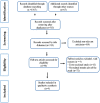
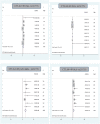

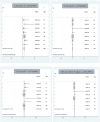
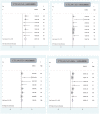
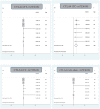
Similar articles
-
CTLA-4 polymorphisms and predisposition to digestive system malignancies: a meta-analysis of 31 published studies.World J Surg Oncol. 2020 Mar 16;18(1):55. doi: 10.1186/s12957-020-1806-2. World J Surg Oncol. 2020. PMID: 32178688 Free PMC article.
-
Effect of CTLA-4 gene polymorphisms on long-term kidney allograft function in Han Chinese recipients.Oncotarget. 2016 Apr 26;7(17):23088-95. doi: 10.18632/oncotarget.8714. Oncotarget. 2016. PMID: 27081086 Free PMC article.
-
CTLA4 gene polymorphisms influence the incidence of infection after renal transplantation in Chinese recipients.PLoS One. 2013 Aug 27;8(8):e70824. doi: 10.1371/journal.pone.0070824. eCollection 2013. PLoS One. 2013. PMID: 24015180 Free PMC article.
-
Association of four CTLA-4 gene polymorphisms with pemphigus risk: a systematic review, meta-analysis, and meta-regression.J Int Med Res. 2024 Oct;52(10):3000605241282116. doi: 10.1177/03000605241282116. J Int Med Res. 2024. PMID: 39397428 Free PMC article.
-
Associations between cytotoxic T-lymphocyte-associated antigen 4 gene polymorphisms and diabetes mellitus: a meta-analysis of 76 case-control studies.Biosci Rep. 2019 May 15;39(5):BSR20190309. doi: 10.1042/BSR20190309. Print 2019 May 31. Biosci Rep. 2019. PMID: 30988065 Free PMC article.
Cited by
-
CTLA4 Single-Nucleotide Polymorphisms Influence the Risk of HSV and VZV Infection in Kidney Transplant Recipients: A Prospective Cohort Study.Transpl Int. 2025 May 21;38:14648. doi: 10.3389/ti.2025.14648. eCollection 2025. Transpl Int. 2025. PMID: 40469083 Free PMC article.
References
-
- Sperling AI, Bluestone JA. The complexities of T-cell co-stimulation: CD28 and beyond. Immunol Rev. 1996;153:155–82. - PubMed
-
- Chen L. Co-inhibitory molecules of the B7–CD28 family in the control of T-cell immunity. Nat Rev Immunol. 2004;4(5):336–47. - PubMed
-
- Alegre M-L, Frauwirth KA, Thompson CB. T-cell regulation by CD28 and CTLA-4. Nat Rev Immunol. 2001;1(3):220–28. - PubMed
-
- Grohmann U, Orabona C, Fallarino F, Vacca C, Calcinaro F, Falorni A, Candeloro P, Belladonna ML, Bianchi R, Fioretti MC, Puccetti P. CTLA-4–Ig regulates tryptophan catabolism in vivo. Nat Immunol. 2002;3(11):1097–101. - PubMed
-
- Wing K, Onishi Y, Prieto-Martin P, Yamaguchi T, Miyara M, Fehervari Z, Nomura T, Sakaguchi S. CTLA-4 control over Foxp3+ regulatory T cell function. Science. 2008;322(5899):271–75. - PubMed
Publication types
MeSH terms
Substances
LinkOut - more resources
Full Text Sources
Medical
Research Materials

